Roll of honour
| Edition | Winners | Second | Third |
|---|---|---|---|
| 1956 | | | |
| Race details | |
|---|---|
| Date | August |
| Region | Rio de Janeiro, Brazil |
| Discipline | Track |
| Type | Six-day racing |
| History | |
| First edition | 1956 |
| Editions | 1 |
The Six Days of Rio de Janeiro was a six-day cycling event, held in Rio de Janeiro. The event was only held once, in August 1956, won by Italian-Argentine team Severino Rigoni and Bruno Sivilotti. [1]
| Edition | Winners | Second | Third |
|---|---|---|---|
| 1956 | | | |

Arpoador is a region located on the southern zone of the city Rio de Janeiro, in a small peninsula between Ipanema and Copacabana. Part of its territory belongs to the neighbourhood of Ipanema, and part to Copacabana.
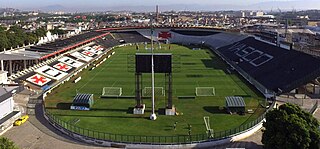
Estádio Vasco da Gama, also known as Estádio São Januário, owing to its location on a street of the same name, is the home ground of Club de Regatas Vasco da Gama. Its facade is listed by the National Historical and Artistic Heritage.
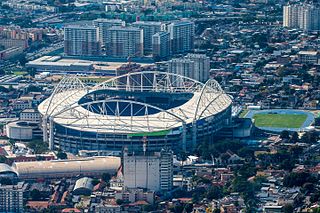
Estádio Olímpico Nilton Santos is a multi-purpose stadium located in the neighbourhood of Engenho de Dentro in Rio de Janeiro, Brazil. It is used mostly for football matches and athletics and is the home stadium of the football club Botafogo. The stadium was built by a consortium under the leadership of Odebrecht S.A., from 2003 through to 2007, opening in time for the 2007 Pan American Games. It hosted the athletics competitions at the 2016 Summer Olympics and the 2016 Summer Paralympics. It was one of the five venues for the 2021 Copa América.
The Deodoro Military Circle is a Brazilian Army sport facility in Rio de Janeiro, at the Military Village, on the western side of the city. It has hosted the Pan American Games, Rio 2007. Equestrian, Field Hockey, Modern Pentathlon, Sport Shooting and Archery competitions.

Flamengo Park, also known as Aterro do Flamengo, Eduardo Gomes Park, and Aterro do Brigadeiro Eduardo Gomes, is the largest public park and recreation area within the city of Rio de Janeiro, in eastern Brazil, and the largest urban park by the sea in the world.

Copacabana Stadium, also known as the Beach Volleyball Arena, was a temporary stadium located on Copacabana beach, in Rio de Janeiro, Brazil, that hosted the beach volleyball competition of the 2016 Summer Olympics. It was erected in 2016 specifically for the Olympic Games and was planned to be dismantled after the Games.

Castelo is a region in Rio de Janeiro, Brazil, but not officially recognized as a neighborhood, and officially forming part of the Centro neighborhood. It is generally considered to be located in the region between Avenida Rio Branco, the Santos Dumont Airport and Praça Quinze de Novembro. The area derives its name from the former Morro do Castelo in that location, which was demolished by water jets in the 1920s. As most of the buildings in the area were designed and built in the first half of the twentieth century, after the demolition of Morro do Castelo in 1921, the region became home to a large collection of Art Deco buildings. Art Deco was the prevalent architecture style in Rio de Janeiro at that time.
Aldeia Campista was a neighborhood in Rio de Janeiro, Brazil, close to contemporary Vila Isabel, Tijuca, Maracanã and Andaraí.
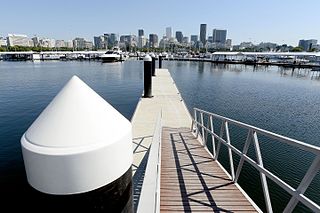
Marina da Glória is a marina located in the neighbourhood of Glória in Rio de Janeiro, Brazil. This venue hosted the sailing events for the 2016 Summer Olympics within the Flamengo Park cluster, from 7 to 19 August 2016. and the 2016 Summer Paralympics. It also hosted the draw procedure for the Qualification for the 2014 FIFA World Cup.

The National Shooting Center, known as the Olympic Shooting Centre during the 2016 Summer Olympics, is a firing range in Deodoro, Rio de Janeiro, Brazil. The range was opened in 2007 and was upgraded to host the sports shooting events for the 2016 Summer Olympics and the 2016 Summer Paralympics.

The Olympic BMX Centre is a cycling venue, constructed for the BMX racing events at the 2016 Summer Olympics in Rio de Janeiro, Brazil.

The Mountain Bike Centre is a cycling venue in Deodoro Pentathlon Park, located in the Deodoro district of the West Zone in Rio de Janeiro, Brazil.
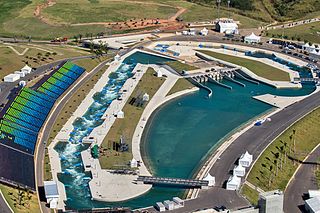
The Deodoro Olympic Whitewater Stadium is a whitewater paddling venue, constructed to host the canoeing and kayaking slalom events for the 2016 Summer Olympics in Rio de Janeiro. The stadium is part of the 'X-Park' sport complex located in Deodoro, Rio de Janeiro, Brazil.
Rio das Pedras is a region of Rio de Janeiro, but not officially recognized as a neighborhood. The favela sits in Rio de Janeiro’s West Zone by the neighborhood of Itanhangá. Rio das Pedras’ borders are defined by the Tijuca National Park, the Tijuca Lagoon, and private land designated for the expansion of Barra da Tijuca.

The Legislative Assembly of Rio de Janeiro is the unicameral legislature of Rio de Janeiro, a state in Brazil. It has 70 state deputies elected by proportional representation.
Bairro Araújo is a region of Rio de Janeiro, but not officially recognized as a neighborhood.localizado em Vista Alegre
Horto is a community of 621 families in the South Zone of Rio de Janeiro. It is not officially recognized as a neighborhood. It is located in Jardim Botânico, near Gávea, and Lagoa. The property is worth an estimated $3.29 billion.

Deodoro Stadium is a temporary stadium at Deodoro Modern Pentathlon Park in Rio de Janeiro, Brazil. The stadium hosted rugby sevens and modern pentathlon events during the 2016 Summer Olympics. The stadium served as the venue for the seven-a-side football at the 2016 Summer Paralympics.

The Deodoro Aquatics Centre is a swimming venue in Deodoro, Rio de Janeiro, Brazil, that hosted the swimming events in the modern pentathlon at the 2016 Summer Olympics.
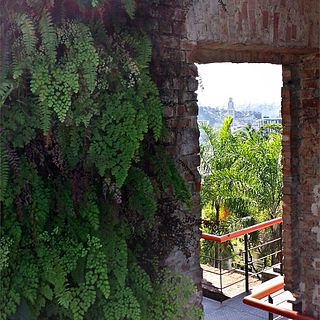
The Centro Cultural Municipal Parque das Ruínas, or simply Parque das Ruínas(Ruins Park), is a public park with an art gallery built around the ruins of a mansion, located in the Santa Teresa neighborhood in Rio de Janeiro, Brazil. It is a venue for live outdoor concerts and houses a bar.
Coordinates: 22°33′01″S43°06′42″W / 22.5503°S 43.1117°W